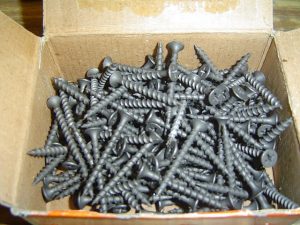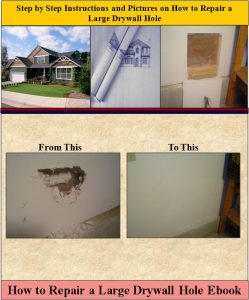Using the Wrong Drywall Screws Could Lead to Less than a Professional Drywall Finish
By Mark J. Donovan
|
|
Question on when to use coarse or fine drywall screws: I am about to install drywall in my family room addition and am not sure what type of drywall screw to use.
When I was at the home improvement store I discovered they sell both fine threaded drywall screws and coarse threaded drywall screws. Do you have any guidance or recommendations on the use of fine versus coarse threaded drywall screws? |
Answer: You raise a good question. The drywall screw is frequently a last minute purchase with little thought given by many do it yourself homeowners.
This is unfortunate as the type and length of drywall screw used can make a significant difference in the finished results of your drywall project. Using the wrong type or length of drywall screw can lead to a less than professional drywall finish. If the wrong type or length of drywall screw is used visible dimples, pops and/or seams can begin to quickly show in your finished walls.
In addition, drywall screws offer much stronger pull strengths and as a result do a better job of holding drywall. However with wood studs being the norm in residential construction, coarse thread drywall screws were required.
Drywall screws are unique in features and thus are specially designed for drywall applications. Consequently they should not be substituted with deck screws or other types of screws when hanging drywall.
Drywall screws are manufactured out of case hardened steel. In addition, they have bugle shaped Philips heads and piercing tips that are specifically designed to attach drywall to wood and metal studs, while not damaging the drywall in the process. Drywall screws are normally coated in a black phosphate finish.
| In terms of the length of drywall screw to use, 1-1/4” long drywall screws should be used with ½” thick drywall and 1-5/8” long drywall screws should be used for 5/8” thick drywall.
So make sure you use the right drywall screws when hanging drywall. Also, consider purchasing a drywall screw gun. Drywall screw guns can dramatically speed up the process of hanging drywall. In addition, they have adjustable torque sensitive clutches to control the depth of the drywall screw so that you do not break the paper surface of the drywall when installing the drywall screw. |
 |
Over-screwing the drywall screw and breaking the face paper on the drywall weakens the fastener and typically leads to visible dimples and seams. In addition, they have adjustable torque sensitive clutches to control the depth of the drywall screw so that you do not break the paper surface of the drywall when installing the drywall screw.
Over-screwing the drywall screw and breaking the face paper on the drywall weakens the fastener and typically leads to visible drywall dimples and tape seams.
For information on repairing a large drywall hole, see the “How to Repair a Large Drywall Hole” Ebook from HomeAdditionPlus.com. The “How to Repair a Large Drywall Hole” Ebook provides step-by-step instructions on how to repair your damaged wall so that it looks as good as new.
See HomeAdditionPlus.com’s Drywall Calculator
Related Information on Coarse or Fine Drywall Screws
- Using Coarse Thread Drywall Screws
- New Light Weight Drywall Panels from USG
- Cement Backerboard versus Greenboard Drywall
Additional Drywall Installation Resources from Amazon.com
 |
 |
Free Home Addition Price Quotes with No Obligation!
Fill out our 3-5 minute quick and easy form, and receive a free price quote on a house addition from one of our prescreened and licensed home addition contractors. This process is free and there is no obligation to continue once you receive your house addition price estimate.


